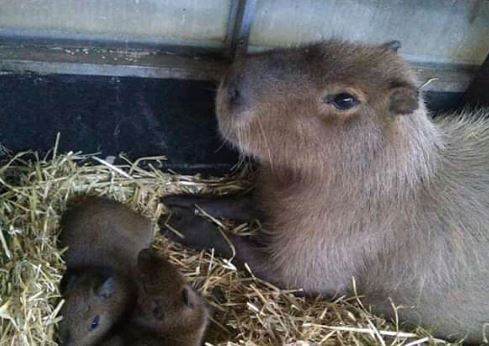Michigan is one of the best places to live in the United States. If you live in Michigan and want to keep a pet capybara, it would be best to read this post to know how possible it is.
While dogs and cats are popular pets in the United States, people may want to keep animals that are rare to be domesticated. The capybara is one animal that has gotten love and attention in many homes.
These rodents are from the wild but can be kept in homes and domesticated as other pets. However, capybaras are wild animals; their needs and lifestyles are different from those of conventional household pets. The large size and vigorous lifestyle of these rodents make it difficult to keep them in a residential apartment or activity.
Keeping a capybara in a residential environment can cause untold damage to crops, furniture, and household property. Potential owners must show their preparedness and meet certain requirements before keeping a pet capybara.
Before owning any exotic pet in the United States, it is important to consult the appropriate authorities in your region, as every state in the US have its own regulations, rules, and laws regarding animal ownership, and the law differ from state to state.
This article helps you know the prospects of owning a capybara in Michigan and the legal requirements and processes to meet before having one.
What is a Capybara?

The capybara is a large rodent believed to have originated from South America. They can be identified by their thick, brownish waterproof fur and webbed feet.
A capybara can grow up to 140 pounds, making them the largest rodents in the world. There are herbivores and semi-aquatic animals and they feed on a variety of meals, including water plants, tree barks, grasses, vegetables, and fruits.
The capybara enjoy staying close to areas where they can find water such as swamps, marshes, lakes, streams, rivers, and ponds. As long as there is enough water in the wild, you can be sure to find the capybara in large numbers. They are great swimmers and typically submerge themselves underwater for extended periods.
The capybara resides in large groups composed of males and females. A herd of capybara can consist of 20 members or more, depending on the season and weather conditions. The capybara is different from most wild animals as they are social and friendly. Their fun and friendly nature has given several people the impression to keep them as pets.
However, it is pertinent to note that capybaras are wild animals and are not suitable to be kept as pets in a confined facility. But if you can provide an environment identical to its natural habitat with access to water and meet its dietary needs, it would be fun to have it as a pet.
Are Capybaras Legal In Michigan?
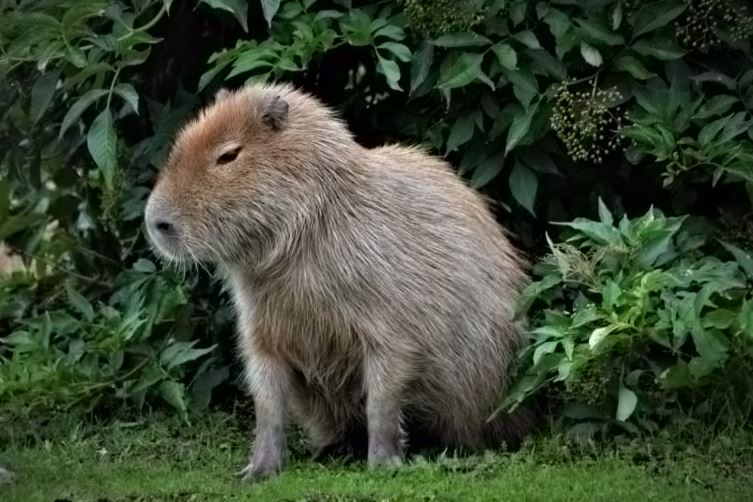
The law in Michigan doesn’t permit residents to keep a capybara as a pet. One of the reasons for this is that the capybaras can cause serious damage to residential property. Simply put, keeping a capybara as a pet in Michigan is illegal.
As wild animals, capybaras are accustomed to living in the wild. They graze on bushes, grasslands, and vegetation, and spend a lot of time bathing in rivers, and it can be difficult to provide such an environment in a residential setting.
In places where it is legal to own a capybara, there is significant damage to property. Capybaras are typically large in size; it will be difficult to keep this rodent if stay in a tight or small apartment. This animal is known for its active lifestyle and agility, so they need a lot of space as well as a pool.
If you can’t provide a pool on your property for the capybara, it will be a bad idea to have a capybara in the first place. The capybara enjoys dipping itself in water to cool off the heat and regulate its temperature. The rodents spend a large portion of their time cooling off in water and can even take a nap in it.
Furthermore, the capybara has strict dietary needs. A capybara can eat up to 8 or more pounds of grasses daily. So, you would want to ensure the capybara you intend to keep is provided with enough grasses and vegetation. Most importantly, it needs a varied diet, which can be mixed with fruits.
Keep in mind that the capybara poses a danger to the public when aggressive. The capybara can grow to become aggressive if left in isolation.
Therefore, if you are getting a capybara, ensure to get two capybaras. This will help both animals socialize and know themselves. This way, their friendly nature is harnessed and their aggressiveness is suppressed. If you cannot afford to take care of another capybara, then you must be willing to spend more time with your pet capybara.
It is crucial to consider the aforementioned factors before buying a capybara. People who desire to keep or own any exotic animal, including capybaras in Michigan can procure a license or permit from the Michigan Department of Natural Resources (DNR).
The permit process typically begins with consulting the department, submitting an application, meeting the requirements and criteria of the institution, and paying any fee required.
The table below shows the places where it is legal to own a pet capybara in the United States.
| STATE | LEGALITY |
| Alabama | Legal |
| Alaska | ILLEGAL |
| Arizona | Legal |
| Arkansas | Legal |
| California | ILLEGAL |
| Colorado | ILLEGAL |
| Connecticut | ILLEGAL |
| Delaware | Legal |
| Florida | Legal |
| Georgia | ILLEGAL |
| Hawaii | Legal |
| Idaho | Legal |
| Illinois | ILLEGAL |
| Indiana | Legal |
| Iowa | Legal |
| Kansas | Legal |
| Kentucky | Legal |
| Louisiana | Legal |
| Maine | Legal |
| Maryland | Legal |
| Massachusetts | ILLEGAL |
| Michigan | Legal |
| Minnesota | Legal |
| Mississippi | Legal |
| Missouri | Legal |
| Montana | Legal |
| Nebraska | Legal |
| Nevada | Legal |
| New Hampshire | Legal |
| New Jersey | Legal |
| New Mexico | Legal |
| New York | ILLEGAL |
| North Carolina | Legal |
| North Dakota | Legal |
| Ohio | Legal |
| Oklahoma | Legal |
| Oregon | ILLEGAL |
| Pennsylvania | Legal |
| Rhode Island | Legal |
| South Carolina | Legal |
| South Dakota | Legal |
| Tennessee | Legal |
| Texas | Legal |
| Utah | Legal |
| Vermont | ILLEGAL |
| Virginia | Legal |
| Washington | Legal |
| West Virginia | Legal |
| Wisconsin | Legal |
| Wyoming | Legal |
How To Get a Capybara License or Permit In Michigan
The best way to own a capybara legally in Michigan is to get a permit or license. If you don’t know how to go about the process, I will tell you how.
Meeting the regulations and requirements set by the Michigan Department of Natural Resources (DNR) shows your eligibility to own a capybara in the state.
Follow the guide below to see how to obtain a capybara license or permit in Michigan in three easy steps:
1. Consult the Michigan Department of Natural Resources
Your capybara permit application begins the moment you reach out to the Michigan Department of Natural Resources. Here, you will tell them your desire to own a capybara and inquire about the procedures, documents, and requirements to get a permit.
The officials at the Michigan Department of Natural Resources will give you the most accurate and reliable answers to any questions you may have about the capybara ownership application.
Next, they will provide documentation and collect the necessary information for the license application such as your full name, address, contact information, occupation or business info, and any other important information.
2. Experience in Animal Care and Welfare
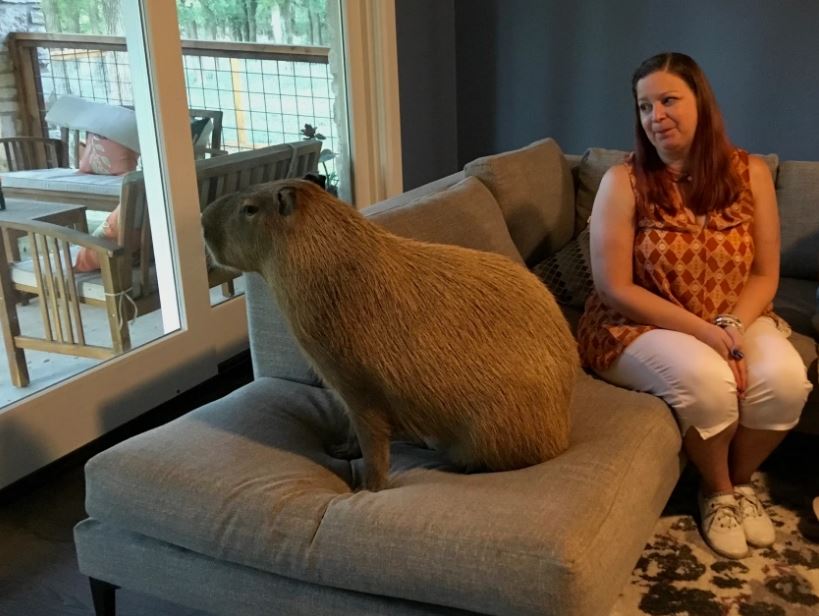
While applying for a capybara permit, you must be ready to demonstrate your knowledge, expertise, and experience in handling capybaras. Showing your previous experience with caring for exotic animals and other pets increases your chances of getting a capybara license.
If you have little knowledge about the capybara, I would advise you to do more research and get more information about the pet you are about to acquire.
You may be requested to provide information about how you will be caring for and handling the capybara. This shows you understand your responsibilities as well as the needs, behavior, and lifestyle of the rodents and can provide a good environment for them.
When applying for a permit, you must provide detailed information about how you will be caring for the capybara, including the type of area the rodent will be kept, the size and dimensions of its enclosure, the materials used in constructing it, the security measure you will employ to prevent the animal from escaping, harming humans and other animals, or destroying people’s property.
The DNR has strict enclosure guidelines to ensure the safety of capybaras in the state. After consulting them, you would want to ensure that you follow their enclosure requirements and guidelines. The permit requirements for owning a pet capybara are done to ensure the animal’s well-being and ensure the security of the animal, its owner, and the general public.
The DNR prioritizes factors related to public security and safety when reviewing permit applications. They will assess the potential risks involved with capybara ownership and determine whether the owner can manage the rodent and effectively reduce the risks.
Since the DNR has specific requirements and regulations regarding capybara ownership, you are advised to comply with the requirements to obtain a permit.
Additionally, the DNR wants to know your plans for the animal’s welfare and well-being. So, you will want to show how you will be feeding the animal and meeting its dietary needs. Also, you will show proof of access to veterinary care for the rodent.
You can choose to include the details or information of a veterinarian in your locality who is well-versed in exotic animal care and health. Typically, owners are required to include proof of access to medical care for their pets but if this isn’t required, including it in your application increases your chances of getting a permit.
Providing access to veterinary care shows the capybara will receive proper medical attention when the need arises.
3. Finalize and Submit the Application
Fill out the permit application provided by the DNR with the right information. Take your time to go through the form and check for any additional requirements or questions.
Be ready to provide not only detailed answers to the questions but to provide accurate and reliable information. After filling out the form, go through the fields and check for any errors or missing details.
After filling out the permit application form, submit your application and wait for feedback. Be prepared to spend some time waiting for feedback as the Michigan Department of Natural Resources will review your application.
Several people make the mistake of buying a capybara during the waiting period to demonstrate how they will cater to the pet.
It is important to notify you that keeping a capybara in Michigan without a permit is illegal. Violating this law can result in penalties such as confiscation of the animal, imposement of fines, criminal charges, or even legal action. Therefore, ensure to understand the laws and comply with them.
Ensure you don’t violate any DNR regulation or requirement. Adhering to the DNR rules will see you receive a license.
You will receive a notification or message from the DNR about the status of your application. If your license application is approved, the DNR will issue a permit authorizing you to keep a capybara in Michigan.
Ensure to read the terms and conditions and other details in the permit and comply with each one of them. Flouting these conditions can cause you to lose your license.
Ensure the animal is properly catered for in your custody. Apart from the rodent’s welfare, be sure to adhere to other terms and conditions in the permit.
Factors To Consider Before Buying a Capybara In Michigan
Apart from the legal requirements to be fulfilled, there are other crucial requirements that must be met before owning a capybara in Michigan or anywhere. In this section, we will focus on the factors that must be considered before keeping a pet capybara.
1. Space Requirements
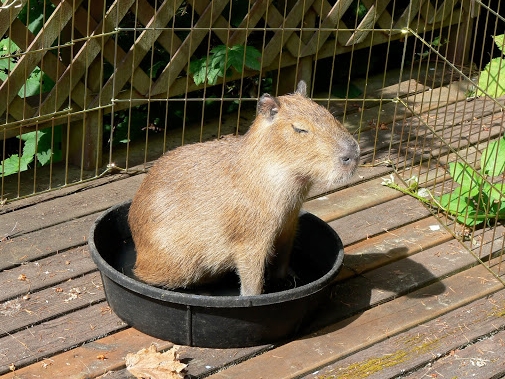
Capybaras require enough space to roam due to their large size. These rodents won’t thrive if bred in small spaces that give them little or no room to explore.
Owners can provide their pet capybaras with an environment that mimics their natural habitat, which is characterized by its spaciousness, access to water, and vegetation.
Before buying a capybara or applying for a permit, you would want to ensure you have ample space to keep the pet.
2. Climate Considerations
Capybara are strangers to tropical and subtropical regions. As a matter of fact, these rodents come from countries with warmer climates. For this reason, they spend a lot of time in water, swimming, bathing, and cooling off the heat.
On the flip side, the weather in Michigan is cold, which can be harsh for the animal. Nevertheless, it is impossible to breed the rodent in capybara.
If you will be keeping the capybara in your Michigan residence, you should seriously consider providing a suitable environment for the rodent, especially during the severe winter season. You can install heating systems in the capybara’s enclosure or improvise a way of keeping the animal protected from the effects of cold.
3. Specialized Diet

If you will be keeping a pet capybara, you should be conscious of its dietary requirements. The capybara is a herbivore and feeds mainly on fresh vegetables, fruits, hay, grasses, tree barks, water plants, and other forms of vegetation.
While you provide grasses for the rodent, you also want to ensure it enjoys other varieties of meals. Providing your pet capybara with proper diet and nutrition will aid the growth and development of the animal.
Before getting a capybara, you also want to make sure you have access to grasses and other food sources for it. If you don’t have access to its natural food sources, you may want to buy from the market but this can be costly in the long run as the capyabra is known for its large appetite.
4. Time and Commitment
Owning a capybara or any other pet is a responsibility. In other words, you must show commitment to spending time and caring for the animal.
The capybara requires daily care and attention from its owner. Capybara owners are responsible for feeding and grooming the animal, training the animal, and taking it to a vet when necessary.
If you will be bringing a capybara into your home, ensure you have the facilities and resources in place to raise the animal.
Another thing you want to consider is whether you have time to spend with the animal or you have someone around who can spend ample time with the animal, as the capybara dislikes inactivity and isolation.
5. Social Needs
As mentioned in the previous point, the capybara dislikes isolation. They are highly social animals and crave attention from people and animals.
The capybara enjoys the company of other capybaras as well as other rodent species. They are friendly, which is why they thrive in groups. Therefore, it will be wise to get at least two capybara to help them bond with each other.
The social needs of the capybara are essential and every owner must consider them carefully. The capybara gets friendly the more you associate with it but if left in captivity or isolation, it can get paranoid and become aggressive.
Ideally, you want to provide an environment where the animal can socialize and interact with you or other capybaras.
Why You Should Not Keep a Pet Capybara In Michigan
There are several reasons that suggest that keeping a pet capybara in Michigan is wrong. To start with, keeping rodents as pets in Michigan without a permit or license is illegal.
While capybaras may be adopted and kept as pets in several parts of the United States, Michigan has stringent laws regarding the ownership of exotic animals, including capybaras. Unlike other pets, the capybara requires a lot of care and attention from their owners. These rodents are native to the wild and can cause serious damage to property if left unattended.
As stated, the capybara needs a wide space to explore and roam about. So, if you will be keeping this rodent in your custody, it is important to provide it with a large enclosure, where it can move around without feeling caged or incarcerated. The capybara desires companionship, and you can either provide this by getting an extra capybara to keep it company or you create time from your schedule to spend some time with it.
Also, it is important to provide it with a lot of grasses and vegetables to select from. You would also want to provide a swimming pool or pond for the capybara to dip itself when it feels necessary.
Many capybara owners provide their pets with an environment that simulates their natural habitat. Some create an enclosure in their yard or garden where the rodent can roam about and play as it wishes. They also tend to construct a large swimming pool for the rodents to bathe and play.
Truthfully, regardless of how hard you try to create an environment identical or closer to the capybara’s habitat, you can never replace its natural habitat.
If you don’t want to go through the stress of filling out and submitting documentation to obtain a permit, it will not be a good idea to get a pet capybara in Michigan.
Getting a capybara without a permit can lead to severe consequences such as legal issues or fines. Suppose you want to keep a pet, consider other animals that are legal to own in Michigan.
Below are some reasons why you shouldn’t keep a pet capybara in Michigan:
1. Capybaras Are Wild Animals

The capybara is a wild animal but it can be domesticated. Since these animals originated from the wild and are used to wildlife, keeping them on residential property seems awkward.
As wild animals, the capybara can be dangerous if not properly handled. This is why it is important for the owner to study and understand the lifestyle and behavior of the rodent before purchasing it. Like most animals in the wild, the capybara’s behavior can be unpredictable sometimes.
Capybara owners must understand the needs of their pet and ensure it is provided with everything it needs to stay happy always. Capybaras need enough food, water, a spacious environment, and companionship to stay physically and mentally healthy.
Some people buy toys or multiple capybaras to encourage good behavior and attitude in the animals. Ideally, the capybara tends to become more friendly and social when it finds fun and excitement in its enclosure.
However, if you can’t provide plenty of space for the animal or you fail to provide a playmate or find time for the animal, they will become aggrieved and can attack anyone.
To prevent the rodents from harming others, it is important to provide them with time, resources, and other essential care they will need. If you can’t do this, don’t consider getting a capybara in the first place.
Like other wild animals, the laws in Michigan don’t allow individuals to keep them as pets. Suppose you find a capybara around your vicinity, it would be best to take it to the wild, where it can explore and enjoy its life rather than keeping it illegally in your apartment.
2. They May Cause Severe Damage to Property
Like many animals raised in the wild, the capybara can cause a lot of damage to property and items if not monitored or cared for. They are known for their activity and roam from place to place. If you will be keeping this animal in your residence, it is important to provide an enclosure for it or take measures to prevent it from damaging your property.
The capybara has deep, long teeth, which it uses for cutting tree bark and grasses in the jungle. Any item in your home can seem appealing to the capybara. It can use its strong teeth to create deep holes in your chairs, furniture, walls, and floor, and can chew wood, cables, clothes, and even concrete.
This rodent is extremely destructive; it is essential to create an enclosure for the animal to prevent it from ruining your property.
Creating a safe, spacious enclosure for the rodent with plenty of toys will keep the animal engaged with activities. Still, it is important to check on the rodent from time to time to be sure it isn’t damaging any item around it.
Another great thing you can do is to fill the capybara’s pool with oranges, lemons, and all kinds of citrus fruits. Doing this will keep the capybara proactive, prevent idleness, and lessen the risk of destroying any precious property in your home.
3. Capybaras Have Special Requirements
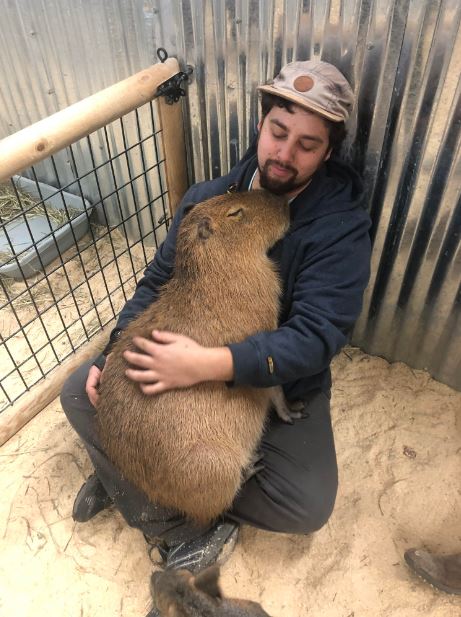
Owning and caring for a capybara is not an easy task. Capybaras need specialized care, which makes owning them a serious responsibility for potential owners.
Not everyone can provide the kind of space or environment the capybara can thrive. Depending on the size of your apartment or property and its facilities, the capybara may enjoy the resources it provides.
Remember that the capybara is a semi-aquatic animal, so it is essential to provide it with access to water to bathe and swim. Providing a pool of water for the rodents is an indispensable factor. Without this, the capybara may get sick of staying in your custody.
The capybara finds comfort and happiness in its environment. If you provide the animal with a thriving and enabling environment, it will live longer than it would have lived in the wild.
The capybara’s dietary needs are as important as other requirements. This rodent requires a variety of fresh vegetation such as fruits, vegetables, and grasses to consume.
Providing large space, access to food and water, and veterinary services will keep the capybara’s health at optimal status.
Conclusion
The Michigan Exotic Animal law confirms that it is illegal to own a capybara or any wild animal in Michigan. However, that doesn’t make it impossible for individuals in the state to own pet capybaras.
You can obtain a permit from the Michigan Department of Natural Resources to legally keep a capybara in the state. However, you must know that the permit is not issued to everyone who applies. There are strict requirements and guidelines, which must be met and fulfilled before your application is approved.
The DNR’s guidelines and regulations regarding capybara ownership were formulated to ensure the safety of the animal, its owner, and the general public. So, ensure you adhere to the regulations to prevent your license from being revoked.
Hopefully, this post has provided you with all the details and information needed about getting a capybara in Michigan. While you apply for a capybara license or permit, it is important to consider your responsibilities as a capybara owner and other factors needed to keep the rodent.

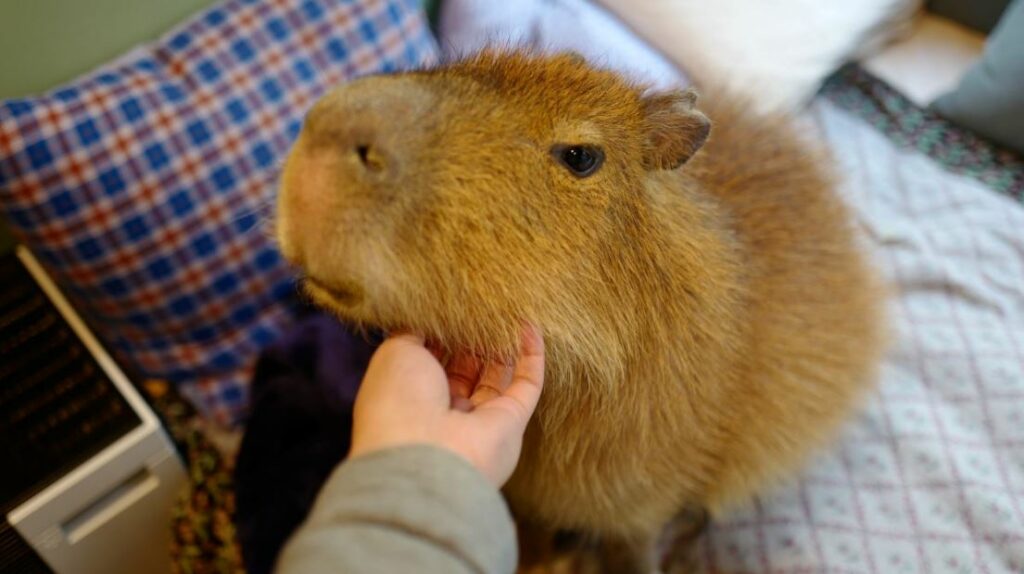
![Capybara Meat And Its Culinary Uses - [Every You Should Know] Capybara Meat & Culinary Uses](https://capybaratips.com/wp-content/uploads/2023/03/Capybara-meat-250x200.webp)


![Where Can I Buy a Capybara Near Me? - [Recommended] Where Can I Buy a Capybara Near Me](https://capybaratips.com/wp-content/uploads/2023/03/Near-Me-250x200.webp)
![How To Get A Capybara In China [Steps By Steps] China-Capybara](https://capybaratips.com/wp-content/uploads/2023/03/China-Capybara-250x200.webp)
![How Big Should a Capybara Enclosure Be? - [Sizes & Design] How Big Should a Capybara Enclosure Be](https://capybaratips.com/wp-content/uploads/2023/03/Capy-Enclosure-250x200.webp)
